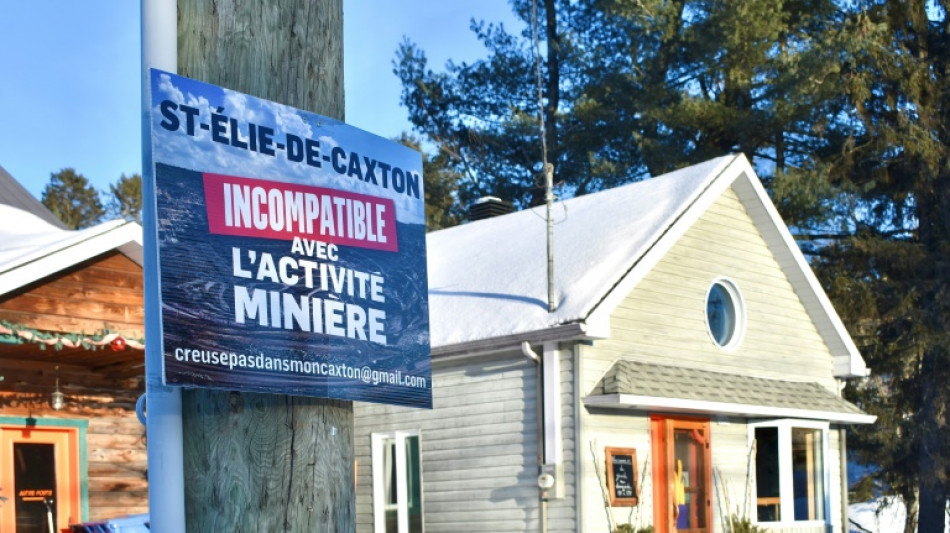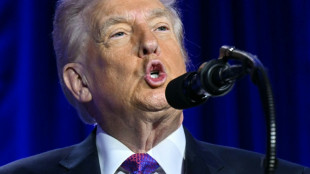
-
 Lindsey Vonn completes second Winter Olympics downhill training run
Lindsey Vonn completes second Winter Olympics downhill training run
-
Freeski star Gu survives major scare in Olympic slopestyle

-
 Iran FM looks to more nuclear talks, but warns US
Iran FM looks to more nuclear talks, but warns US
-
Hetmyer's six-hitting steers West Indies to 182-5 against Scotland

-
 After boos for Vance, IOC says it hopes for 'fair play'
After boos for Vance, IOC says it hopes for 'fair play'
-
Thousands gather as Pakistan buries victims of mosque suicide attack

-
 Lindsey Vonn completes second downhill training session
Lindsey Vonn completes second downhill training session
-
US pressing Ukraine and Russia to end war by June, Zelensky says

-
 Faheem blitz sees Pakistan avoid Netherlands shock at T20 World Cup
Faheem blitz sees Pakistan avoid Netherlands shock at T20 World Cup
-
Trump refuses to apologize for racist clip of Obamas as monkeys

-
 Takaichi talks tough on immigration on eve of vote
Takaichi talks tough on immigration on eve of vote
-
England's Salt passed fit for T20 World Cup opener

-
 Spain, Portugal brace for fresh storm after flood deaths
Spain, Portugal brace for fresh storm after flood deaths
-
Pakistan bowl out Netherlands for 147 in T20 World Cup opener

-
 Pushed to margins, women vanish from Bangladesh's political arena
Pushed to margins, women vanish from Bangladesh's political arena
-
Crypto firm accidentally sends $40 bn in bitcoin to users

-
 Pistons end Knicks' NBA winning streak, Celtics edge Heat
Pistons end Knicks' NBA winning streak, Celtics edge Heat
-
Funerals for victims of suicide blast at Islamabad mosque that killed at least 31

-
 A tale of two villages: Cambodians lament Thailand's border gains
A tale of two villages: Cambodians lament Thailand's border gains
-
Police identify suspect in disappearance of Australian boy

-
 Cuba adopts urgent measures to address energy crisis: minister
Cuba adopts urgent measures to address energy crisis: minister
-
Not-so-American football: the Super Bowl's overseas stars

-
 Trump says US talks with Iran 'very good,' more negotiations expected
Trump says US talks with Iran 'very good,' more negotiations expected
-
Trump administration re-approves twice-banned pesticide

-
 Hisatsune leads Matsuyama at Phoenix Open as Scheffler makes cut
Hisatsune leads Matsuyama at Phoenix Open as Scheffler makes cut
-
Beyond the QBs: 5 Super Bowl players to watch

-
 Grass v artificial turf: Super Bowl players speak out
Grass v artificial turf: Super Bowl players speak out
-
Police warn Sydney protesters ahead of Israeli president's visit

-
 Bolivia wants closer US ties, without alienating China: minister
Bolivia wants closer US ties, without alienating China: minister
-
Ex-MLB outfielder Puig guilty in federal sports betting case

-
 Milan-Cortina Winter Olympics open with dazzling ceremony
Milan-Cortina Winter Olympics open with dazzling ceremony
-
China overturns death sentence for Canadian in drug case

-
 Trump reinstates commercial fishing in protected Atlantic waters
Trump reinstates commercial fishing in protected Atlantic waters
-
Man Utd can't rush manager choice: Carrick

-
 Leeds boost survival bid with win over relegation rivals Forest
Leeds boost survival bid with win over relegation rivals Forest
-
Stars, Clydesdales and an AI beef jostle for Super Bowl ad glory

-
 Dow surges above 50,000 for first time as US stocks regain mojo
Dow surges above 50,000 for first time as US stocks regain mojo
-
Freeski star Gu says injuries hit confidence as she targets Olympic treble

-
 UK police search properties in Mandelson probe
UK police search properties in Mandelson probe
-
Bompastor extends contract as Chelsea Women's boss despite slump

-
 Milan-Cortina Winter Olympics open with glittering ceremony
Milan-Cortina Winter Olympics open with glittering ceremony
-
A French yoga teacher's 'hell' in a Venezuelan jail

-
 England's Underhill taking nothing for granted against Wales
England's Underhill taking nothing for granted against Wales
-
Fans cheer for absent Ronaldo as Saudi row deepens

-
 Violence-ridden Haiti in limbo as transitional council wraps up
Violence-ridden Haiti in limbo as transitional council wraps up
-
Hundreds protest in Milan ahead of Winter Olympics

-
 Suspect in murder of Colombian footballer Escobar killed in Mexico
Suspect in murder of Colombian footballer Escobar killed in Mexico
-
Colombia's Rodriguez signs with MLS Minnesota United

-
 Wainwright says England game still 'huge occasion' despite Welsh woes
Wainwright says England game still 'huge occasion' despite Welsh woes
-
WADA shrugs off USA withholding dues


In Canada's Quebec, residents miffed over mining boom
Canada's Quebec province is rich with minerals needed for everything from electric cars to cell phones, but residents living atop the potential windfall are worried their backyards will be dug up -- and they won't get a dime.
In recent months, tens of thousands of mining exploration permits have been issued in the province amid a global rush for critical and strategic minerals such as graphite, lithium, zinc, nickel and cobalt.
But under provincial mining exploration rules, subsoil in Quebec does not belong to landowners.
In Saint-Elie-de-Caxton, a town of 2,000 people about halfway between Montreal and Quebec City, residents are fed up. Signs around town proclaim "Saint-Elie, incompatible with mining activity" or "Don't Dig in my Caxton."
"We are at war, says Gilbert Guerin, spokesman for the "Don't Dig in my Caxton" committee, pointing to a map delineating exploration claims that have effectively parceled off the town for future mines.
In Quebec, it only takes a few clicks on a website and about Can$75 (US$55) to stake a mining claim covering up to 100 hectares (250 acres) -- an opportunity open to locals and foreigners alike.
"I bought here. I thought I would be sovereign in my own home, but I came to understand that what's underground did not belong to me," says Yvan Lafontaine, surveying his property in the neighboring village of Saint-Mathieu-du-Parc from atop an observation tower he had built.
When Lafontaine learned that a company had acquired the mining rights to the subsoil beneath his land, what the nature lover calls his little "paradise," he fought back by staking 12 claims surrounding the property.
Currently, more than 350,000 claims have been registered, covering 10 percent of Quebec. The southern areas of the province -- where most of the population lives -- is the most sought after.
According to an AFP analysis of government data, the number of claims issued significantly increased from September 2022 to the end of February 2024, with about 160,000 granted -- a 140 percent increase over the previous 18-month period.
- 'Wild West' -
For Saint-Elie resident Julie Hamelin, the mining exploration regulations in Quebec are "outdated."
"It's something out of the Wild West, this way of staking claims," she said, urging provincial authorities to protect inhabited lands from mining.
Guerin, a former civil servant, says he is worried about the "irreversible consequences" that a mining project would have, particularly on the region's groundwater.
To try to discourage mining companies from moving in, residents of Saint-Elie-de-Caxton spent thousands of dollars to buy up more than 220 exploration claims around the village.
Faced with growing public discontent, the Quebec government has announced it intends to modernize its mining law, and insisted in an email to AFP "that no exploration can be carried out without the consent of the owner of private land."
But mining companies definitely are eyeballing Quebec's potential for resources extraction.
"There is a lot of graphite in Quebec. It could be the most important reserve in the world," says Hugues Jacquemin, chief executive of Northern Graphite.
"We absolutely must develop this sector because it is essential for the manufacture of batteries and electric vehicles," he told AFP during a visit to a mine at Lac-des-Iles, 260 kilometers (160 miles) north of Montreal.
Canada is seeking to develop a battery supply chain independent from China, which has until now dominated the market in these critical minerals.
The development of the electric vehicle sector is a priority for both Quebec and Canada, which boasts of being one of the only countries in the world to have all of the necessary minerals to produce batteries.
But in Saint-Elie-de-Caxton and its surrounding areas, not all citizens are on board with the official plans.
"I don't think we should go in this direction," says Hamelin. "The solution is downscaling by using what we already have."
J.AbuShaban--SF-PST

